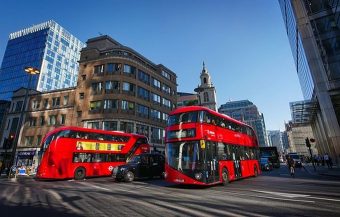
Oil giant Shell and UK start-up bio-bean have teamed up on a project to provide a low carbon biofuel for London buses that contains waste coffee grounds collected from high-street retailers.
The B20 biofuel, which uses a 20 per cent bio-component containing coffee oil, is to be added to the London bus fuel supply chain, the two firms said.
The fuel can be used without any modifications to the bus fleet and promises to deliver sizeable carbon savings.
Founded in 2013, clean tech firm bio-bean produces alternative fuels and ‘coffee logs’ for wood burning stoves made from recycled coffee grounds. It has established partnerships to secure supplies of used coffee grounds from high street chains such as Costa and Caffé Nero.
The coffee grounds are dried and processed before coffee oil is extracted, with bio-bean working with its fuel partner Argent Energy to process the oil into the blended B20 biofuel.
So far, 6,000 litres of coffee oil has been produced, which, if used as a pure-blend for the bio component and mixed with mineral diesel to form a B20, could help power the equivalent of one London bus for one year.
Bio-bean founder Arthur Kay said the latest project was a “great example of what can be done when we start to reimagine waste as an untapped resource”, highlighting statistics that Londoners produce more than 200,000 tonnes of waste coffee a year.
“Our Coffee Logs have already become the fuel of choice for households looking for a high-performance, sustainable way to heat their homes – and now, with the support of Shell, bio-bean and Argent Energy have created thousands of litres of coffee-derived B20 biodiesel which will help power London buses for the first time,” he said.
The collaboration with Shell is part of the oil giant’s #makethefuture energy initiative, which supports entrepreneurs working on low carbon innovations.
Sinead Lynch, Shell’s UK country chair, said: “We’re pleased to be able to support bio-bean to trial this innovative new energy solution which can help to power buses, keeping Londoners moving around the city – powered in part by their waste coffee grounds.”
Source: businessgreen.com

